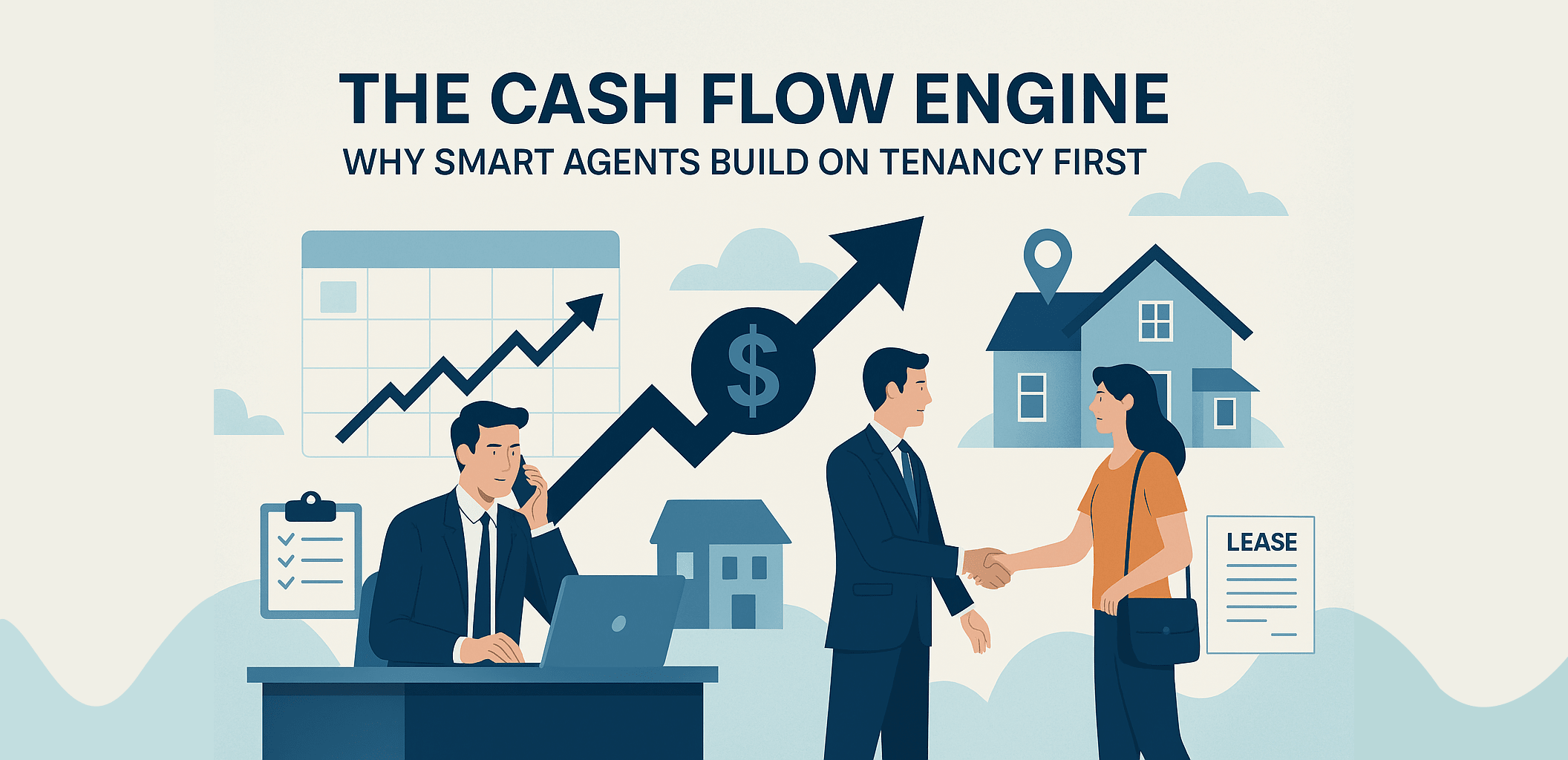The Cash Flow Engine: Why Smart Agents Build on Tenancy First

Most agents learn early that tenancy is simpler, faster, and more dependable than sales. Housing needs are continuous people change jobs, schools, budgets, and space requirements even when buying slows. Rentals move with real life.
Rule of thumb: a consistent rental-focused agent can close 4–6 tenancy deals in the time it takes to close one purchase keeping cash flow steady while the sales pipeline matures.
Demand That Doesn’t Switch Off
Housing needs don’t pause for market cycles. Tenants move because commuting patterns change, children need to be closer to school, or a household wants more (or less) space. Because renting is a shorter commitment, tenants can act quickly. That constant churn creates a steady stream of prospects in almost any market condition.
Lower Cash Outlay, Faster Decisions
Sales are capital-heavy, paperwork-heavy, and emotionally high-stakes. Rentals are lighter on cash and decision friction. Many households can’t or prefer not to—lock up savings in a purchase, yet they still need a roof over their heads (sometimes just a single room to manage budgets). Lower entry barriers compress timelines and widen the pool of ready renters—so more opportunities become transactable, faster.
Short Cycles, High Mobility
Most tenancies run one to two years. Each expiry date is a market “alarm”: renew, relocate for better value, or shift location for work or lifestyle. Short cycles keep activity high. For agents, that means more touchpoints per client and more chances to match stock to need—unlike the slower, one-and-done rhythm of many sale transactions.
One Client, Multiple Earnings
- Renewals: As expiry approaches, secure a renewal fee while reinforcing landlord–tenant trust.
- Relocations: If a better fit exists at a similar price, facilitate the move and earn again.
- Upsize/Downsize: Map life changes (family, work, budget) to new stock for repeat transactions.
- Landlord Portfolio: Satisfied landlords add units—more listings, more deals.
- Graduate to Purchase: When finances improve, convert long-term tenants into buyers.
- Referrals: Smooth experiences generate steady introductions on both sides.
Speed, Momentum, and Survival for New Agents
New agents often struggle with the long gestation of sales—slow lead qualification, complex negotiations, financing approvals, and last-minute fallout. Tenancy offers a practical ramp: larger active market, faster deal velocity, and frequent wins that build skills, references, and a contact base. Early momentum pays bills, builds confidence, and keeps you active while your sales pipeline develops. Over time, your rental book becomes a farm for future listings and buyers.
Operational Advantages That Compound
Tenancy sharpens the fundamentals: rapid lead response, crisp needs analysis, accurate pricing sense, and disciplined follow-up at renewal windows. Because the market turns over quickly, you get more repetitions per month—more at-bats to refine scripts, handle objections, and deepen inventory knowledge. That practice compounds into sharper judgment and higher close rates—in rentals now and sales later.
Reality Check: Rentals vs. Sales
Rental commissions are smaller per deal and can feel like more hassle—yes, you may need 6–7 rental closings to equal one sale commission. But rentals cycle faster, happen more frequently, and create steadier cash flow. There’s no “right” path: if you already have strong buyer pipelines or channels, staying focused on sales makes sense. If not, building a tenancy engine keeps you funded and visible while your sales business matures.
Bottom Line
Tenancy wins on volume, speed, and resilience. It persists in soft markets, moves on lower cash outlay, and cycles quickly enough to create repeatable income. For agents—especially newcomers it’s the most reliable way to stay active, learn fast, and build a durable client base that can later convert into sales.











































































































